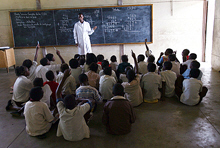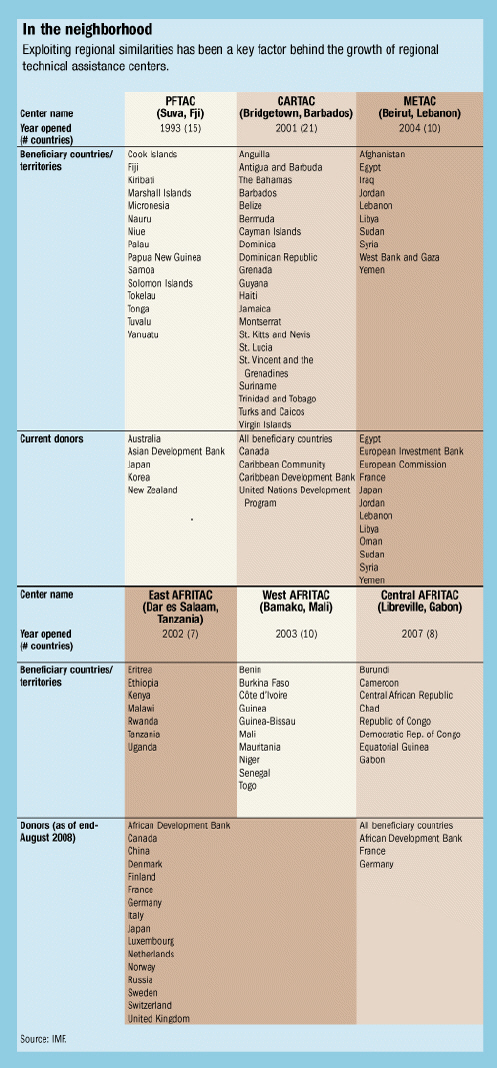
Typical street scene in Santa Ana, El Salvador. (Photo: iStock)
IMF Survey: IMF Plans Four New Regional Technical Assistance Centers
September 15, 2008
- Response to country demand, good experience so far with regional centers
- New centers geared to support regional economic integration efforts
- Strong support from beneficiary countries and donors alike
Seeking to scale up its regional approach to helping member countries, the IMF plans to open four new regional centers for delivering technical assistance.

School in Maputo, Mozambique—a country covered by the IMF's proposed Southern African regional assistance center (photo Jerome Delay/AFP/Getty Images)
CAPACITY BUILDING
The new centers—one in Central America, one in Central Asia, and two more in Africa—are a response to country demand and to positive experience to date with the regional assistance approach. The African centers will complement three existing centers in the region, in Tanzania, Mali, and Gabon.
The centers aim to combine strategic advice from IMF headquarters in Washington with on-the-ground capacity-building assistance for member countries. The new centers cover the following countries:
• Central America, covering Costa Rica, the Dominican Republic, El Salvador, Guatemala, Honduras, Nicaragua, and Panama;
• Central Asia, covering Azerbaijan, Kazakhstan, the Kyrgyz Republic, Mongolia, Tajikistan, Turkmenistan, Uzbekistan, and possibly Pakistan; and
• Two additional centers in Africa—a second regional center in West Africa and a center in Southern Africa. While the country composition of the new centers has not yet been decided, the second center in West Africa could potentially cover Cape Verde, The Gambia, Ghana, Liberia, Nigeria, and Sierra Leone, and the center in Southern Africa could cover Angola, Botswana, Comoros, Lesotho, Madagascar, Mauritius, Mozambique, Namibia, Seychelles, South Africa, Swaziland, Zambia, and Zimbabwe.
As with the existing regional centers, the new centers will work with IMF headquarters to design and deliver an integrated program of technical assistance and training to countries on a regional basis. The centers are also geared to support regional economic integration efforts being pursued by the relevant countries. IMF assistance will boost these efforts by, among other things, promoting the harmonization and coordination of economic policies across countries.
A decade of experience
Over the last decade, regional centers have gradually evolved to play a major role in IMF technical assistance. Experience has shown that these centers, which are largely donor financed, can be especially important vehicles for helping countries carry out economic reforms in coordination with IMF headquarters.
Each regional center covers a small group of countries and serves as a regional base for resident advisors to these countries in core areas of IMF assistance (see chart below). With their physical proximity to countries, regional centers are often better placed than IMF headquarters to handle reform implementation issues on a day-to-day basis. As a complement to the work of IMF headquarters, these centers have proven to be useful platforms to enhance IMF assistance in several important ways:
• Being based in the field, resident advisors at regional centers are able to develop deeper knowledge of the needs and circumstances of countries, and provide more intensive and constant followup on assistance delivered.
• All regional centers are guided by steering committees comprising representatives from donors, beneficiary countries, and other international agencies. This helps promote aid coordination and ownership of reforms, in line with the objectives of the Paris Declaration on Aid Effectiveness.
• Regional centers carry a high potential for economies of scale. Neighboring countries typically have similar economic structures and assistance needs, and a regional approach enables more help to be delivered at lower cost. An added benefit is that regional centers can promote the sharing of reform experiences between countries, allowing officials to adopt tried and tested best practices while minimizing reform risks.
Strategic integration and synergies
Exploiting regional similarities has been a key factor behind the growth of regional centers.
For instance, for the center in Central America, recipient countries have greatly accelerated their integration in recent years, including by establishing and strengthening key regional bodies to steer that process. These include the Central American Monetary Council, the Council of Finance Ministers, and the Council of Financial Sector Superintendents.
The entry into force of the Central America-Dominican Republic free trade agreement with the United States, as well as plans to complete a Central American customs union, mark other milestones in the same direction. In support of these initiatives, IMF headquarters has been scaling up its assistance to Central American countries over the last few years. A regional center would play a critical role in pushing that effort forward.
Similar assistance needs
The proposed Central Asian and Southern African regional centers arise from similar regional factors.
Country coverage in Central Asia will largely mirror that of the Central Asia Regional Economic Cooperation program, while the Southern African center's coverage would be broadly aligned with that of the Southern African Development Community. The second West African center's potential beneficiary countries have very similar assistance needs and will benefit from the sharing of reform ideas and solutions through the center.
Additionally, the opening of the two new Africa centers will mark the fulfillment of the vision set out in the IMF's 2001 Africa Capacity Building Initiative to establish five regional centers to serve all of sub-Saharan Africa.
Strategic guidance and governance
A tripartite organizational framework extends beyond the financial dimension into the governance structure. Each center is overseen by a steering committee composed of representatives from beneficiary countries, donors, and the IMF. These steering committees provide strategic guidance for the centers' work plans, through a consultative process that helps build shared ownership of the assistance delivered.
Consistent with its complementary character to IMF headquarters work, regional assistance will be coordinated with related help that will continue to be delivered from Washington, with both aspects of capacity-building assistance reflected in the IMF's Regional Strategy Notes. These plans articulate and prioritize the capacity-building needs of countries in a medium-term framework and in the context of Fund surveillance and lending activities, to ensure appropriate balance between short-term policy needs and medium-term capacity-building requirements.
Strong coordination and ownership
Participation and support from the key regional bodies and agencies has always been an important facet for all regional centers.
This is especially so given the centers' strong familiarity with local circumstances and reform issues. Indeed, in the existing centers, strong support from regional development banks and financial institutions has been a crucial rallying point to attract financing from other donors. Each center will thus work closely with the respective regional bodies to further countries' reform agendas.
Donor representation in the steering committees also improves coordination of IMF assistance with that from other providers. This arrangement has served the existing centers well, as noted by successive independent evaluations.
Importantly, country ownership and support for these bases is increasingly shown by significant financial commitments from beneficiary countries to their respective centers.
The way forward
As a precursor to the institution of the steering committees for each of the new centers, working groups have already been established to drive the process. Discussions have been initiated with beneficiary countries on broad assistance needs and priorities that could be addressed, and with donors on possible financing for the new centers. It is expected that, by April 2009, the Central American center will be the first of the new centers to open.

Comments on this article should be sent to imfsurvey@imf.org







